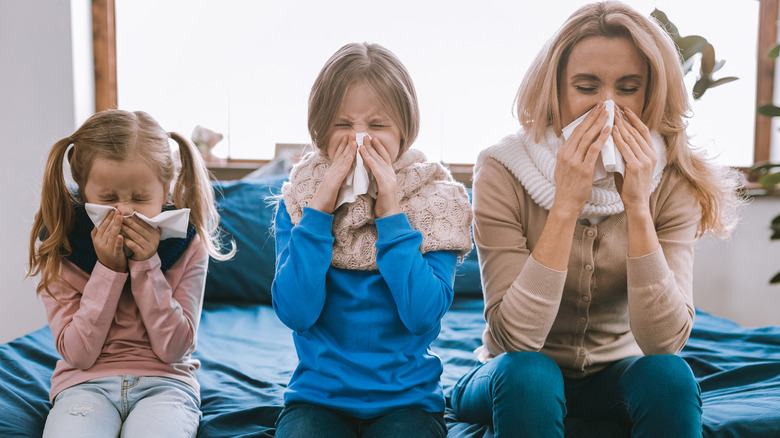Are Allergies Genetic?
According to the American College of Allergy, Asthma, and Immunology, over 50 million people in the U.S. experience allergies yearly, ranking them as the 6th leading cause of chronic illness amongst Americans. Pollen, dust, food, and certain medications can all prompt an allergic reaction within the body (via Kids Health). While generally harmless, the body perceives these intruding substances as a threat, triggering the body's natural immune response. The discomfort of allergies is not exclusive to adults, as they account for nearly 2 million absences in school-aged children annually.
While allergens can include anything from latex to perfumes, reactions are often most prompted by shellfish for adults and milk for children (via Asthma and Allergy Foundation of America). When prompted, our body goes to work protecting us by forming antibodies against the allergen. This process involves the release of chemicals into the bloodstream, which, in turn, can irritate the eyes, lungs, throat, and nose, according to Kids Health.
So is the development of allergies purely environmental, or can biology play a role too?
Allergies can differ between parent and child
When it comes to the environment versus genetics, allergies embody a little of both. According to WebMD, there's no guarantee that a parent's allergy will be passed down to their children. However, depending on whether one or both parents struggle with allergies, the child's likelihood of having an allergy increases. If one parent has an allergy, the odds of passing it along genetically stands at 50%; if both parents experience allergies, the chances climb to 75%.
However, a child can still develop an allergy even if neither parent is allergic. According to News Medical Life Sciences, these odds are low, standing at just one in five chances. So while genetics may play a role in the chances of developing an allergy, that doesn't necessarily mean it will be the same allergy as the parent(s), and genes are not the only factor at play. The specific type of allergic condition a child develops can also be influenced by diet, air pollution, exposure to smoke, viral infections, vaccinations, or daycare attendance.
So while there may be a link between allergies and genetics, our genes can't be singled out as the only contributing factor.

